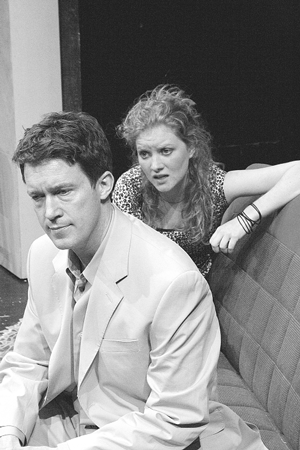Standard summer slump
The dog days of summer are here and the theatrical dogs are fast on their heels. You know you’re in trouble when the kindest thing you can say about a show is the air conditioning in the theater works really well.
Such is the case with two shows currently running downtown. “Crazy for the Dog” is a truly nasty play; it wants to be a dark comedy but is instead a narcissistic fraud. It sets up to be a naturalistic family dram, but playwright Christopher Boal so manipulates the narrative—it’s impossible to believe any of the characters and that ultimately invalidates the entire play.
Paul and Sarah are a married couple living in New York but about to move to San Francisco. Paul’s sister, Jenny, who suffers from a personality disorder and is apparently incapable of functioning as an adult, is angry that Paul is abandoning her. She believes Paul at one point tortured the family cat when they lived together with their alcoholic, mentally ill mother. (Having fun so far?) Jenny retaliates some decade later by kidnapping Paul’s beloved dog and stashing it with her equally unbalanced boyfriend, Kevin. What follows purports to be a dissection of the tragic childhoods of Paul and Jenny and their struggle for stability. However, their actions are not credible, and Boal is not an attentive enough playwright to provide any dramatic foundation for the characters’ behavior. He back-pedals late in the play to give an emotional grounding for Paul and Jenny’s actions, but it’s too little and too late—it feels forced and completely inauthentic. The creaky convention of the dramatic structure is so leaky that the entire enterprise sank the first time Paul, who is supposed to be some kind of caretaker of Jenny, allowed himself to be sucked into a situation that, by his own admission, he knew enough to avoid. Unsympathetic characters acting inconsistently; like “Pig Farm,” this play lacks any kind of valid emotional center, and the pyrotechnics and violence can’t obscure that particular characteristic.
Eric Parness has directed the show at a fever pitch that is grating and often unclear. His understanding of character and human interaction seems to have been formed by repeated viewings of “Whatever Happened to Baby Jane.” It simply feels dishonest, without the mitigating art of camp. One can hardly blame the cast for any of this, and one can only hope that they, like us, find something more mature an honest soon.
Unfortunately, for me at least, finding something better has proven elusive. Instead, I landed at a performance of José Rivera’s “Cloud Tectonics” presented by Out of Line Productions at the Culture Project. Rivera, who is top-of-mind these days for his intriguing and complex new play “School of the Americas” over at the Public, wrote “Cloud Tectonics” as a kind of “Twilight Zone” episode as imagined by Gabriel Garcia Marquez.
The plot centers on what happens when Anibal, an airline baggage handler, picks up Celestina, who is hitchhiking in a Los Angeles rainstorm. Celestina, who is supposed to be the most beautiful woman Anibal has ever seen, has an odd effect on him and his world. Time slows to a crawl and two years passes as though it were one night. We understand this from two visits from Anibal’s brother Nelson who lives in a world where time doesn’t stop. Rivera’s script is lyrical and romantic, a meditation on love and time and the ways in which love can change our reality, and the ways in which humans live in unique realities, often of their own creation.
None of this is evident in the lugubrious mounting James Phillip Gates has given the play. It is a ponderous, slow evening, and the actors move as though through pudding as the story unfolds. The performance clocks in at two tiresome hours, as every point is hammered home. In seeming to focus on the truth of every single moment, Gates loses the poetry of the play—which could use a healthy dose of cutting—and undermines its effect. The realization that Anibal and Celestina have gone into another reality is a long time coming because the play only gets interesting from that point. In a tighter, more fluid production, the energy of the evening—a pregnant stranger, the vulnerability and insecurities of Anibal—would build to a point where their coupling would be both inevitable and romantic. As it is, they plod towards sex, and I found myself looking repeatedly at my watch. The latter part of the play is equally labored as the air is sucked out of the piece, and we wish they would just get on with it.
The cast does pretty well. Luis Vega as Anibal, who has to carry much of the evening, has a wonderful, warm presence and an inherent innocent quality that is appealing, as does Julio Rivera playing his brother Nelson. Their fraternal banter seems false and forced, but they are game. Frederique Nahamani as Celestina never really comes up to the challenges of the part. She seems to drift through the play in an unmodulated stupor. She misses the central tension of the piece—she’s responsible for what’s happening…and she knows it. Instead Celestina seems passive-aggressive, and her ability to recapture the love she had with Anibal when he has returned to natural time lacks the passion the writing requires.
gaycitynews.com
































